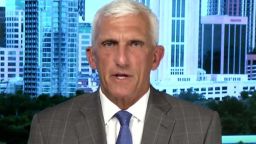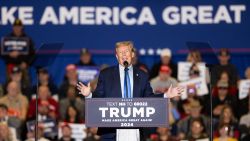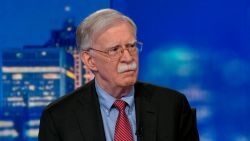At the direction of President Donald Trump, Iran’s military commander, General Qasem Soleimani was killed in an airstrike Thursday. Trump said he ordered the action “to stop a war,” but Iran has vowed revenge. CNN Opinion asked expert commentators to weigh in on the meaning and portent of Soleimani’s killing. The opinions expressed in these commentaries are theirs.
Christiane Amanpour: The world waits with bated breath

Mass funeral rallies will be held for Qasem Soleimani in Iran, and in Iraq’s holiest Shia cities of Karbala and Najaf. The temperature on the streets there, and in other Iran-backed states across the region, will in part determine how Iran’s Islamic Republic will respond to his killing by the United States. But respond it will, say many experts, as Soleimani was a revered and larger-than-life character, a shadowy spymaster mythologized among Shiites and loathed by Iran’s American adversaries.
The world waits with bated breath to see how and where Iran retaliates after three days of official mourning end.
As head of the Islamic Revolutionary Guards Corps Quds Force, Soleimani established networks all over the region. The United States and its allies also have bases, forces and vital interests all over the region.
For decades, Soleimani was responsible for implementing – even orchestrating – Iran’s foreign policy. According to US officials, he masterminded its backing of Hezbollah in Lebanon, propped up and provided the fighting forces for Bashar al-Assad during the brutal Syrian civil war, developed the Shiite militias in Iraq, help create forces to oppose the Taliban and al-Qaeda in Afghanistan – the list goes on.
It is also generally acknowledged, even by the United States, that the US-allied government in Baghdad nearly collapsed in 2014, when ISIS swept into Iraq and took control of huge swaths of the country. Iraqi forces simply abandoned their weapons and tanks and fled – unprotected, since American forces had been withdrawn a couple of years earlier. But Soleimani mobilized a militia force to hold the line and pushed back hard against ISIS, with some arguing he even prevented the terror group from reaching the Iraqi capital.
Although former President George W. Bush’s 2003 war on Iraq defeated Saddam Hussein, Iran’s old enemy next door, Iran was never comfortable having a massive US force on its border. So Soleimani devised an asymmetric warfare strategy against them, including, according to US officials, armor-piercing improvised explosive devices that killed and wounded hundreds of American troops.
For a brief period under the Obama administration, tensions between Iran and the US, eased when they negotiated and successfully implemented the Iran nuclear deal.
But, in 2018, President Donald Trump abandoned the deal and instead implemented draconian new sanctions against Iran, which Tehran calls economic warfare. This US policy of “maximum pressure” did not change Iran’s behavior in the region – but instead began a gradually escalating tit-for-tat process.
Now the US has escalated from economic to potentially real war against Iran. And the most important question now is: what’s the strategy? In the words of former UK Ambassador Tom Fletcher, does the Trump administration have a plan to prevent this killing from being more than just “drive-by adventurism”?
Christiane Amanpour is CNN’s Chief International Anchor.
Frida Ghitis: Soleimani’s killing a positive for the world, but aftershocks loom

This is precisely the moment when you want to have a government filled with knowledgeable, thoughtful minds; when you wish the President of the United States followed a deliberative process, listening to the best ideas and preparing for all contingencies.
Qasem Soleimani, the Iranian commander killed by a US airstrike, was a purveyor of death and destruction. He was the point man for the Iranian regime in its most destabilizing activities, US officials say. Without him, the Middle East would look very different. He made it possible for the murderous Syrian dictator Bashar al-Assad to stay in power, US officials say, and orchestrated Iran’s gradual infiltration and domination of Iraq.
He not only directed the killing of Americans, Pentagon officials say, he fortified Hezbollah in Lebanon and the Houthis in Yemen. Indeed, he helped strengthen the most distasteful elements of many conflicts.
When security experts talk about Iran as “the world’s worst sponsor of terrorism,” it is the activities of Soleimani and his Quds force they are referring to.
If taken in isolation, without regard for its consequences, the end of Soleimani must be seen as a positive for the Middle East and for the world. But it did not happen in isolation. The killing was an earthquake, and the aftershocks are coming.
Was it worth it? It all depends on how prepared the Trump administration is for what’s ahead. This is not a time for boasting and hyperbole. Trump’s latest tweets are not reassuring. It has always been disturbing that the President cannot hold on to government officials. The National Security Adviser position has been a revolving door. The best public servants keep leaving. Trump’s habit of lying at every turn doesn’t help.
Now that the deed is done, we can only hope that the professionals who have studied and prepared to defend the country since long before the current administration have crafted a plan that will make this moment a net positive for the Middle East, for the US and for global security and stability.
Frida Ghitis, a former CNN producer and correspondent, is a world affairs columnist. She is a frequent opinion contributor to CNN, a contributing columnist to the Washington Post and a columnist for World Politics Review. Follow her on Twitter @fridaghitis.
Aaron David Miller: Where’s the strategy?

The moral argument for killing Qasem Soleimani is compelling. American officials have accused him of being responsible for the deaths of hundreds of Americans, and acting as the architect of the campaign to save the murderous Bashar al-Assad regime, which was responsible for the deaths of thousands of Syrians.
But that the US could kill Soleimani doesn’t necessarily mean it should. And his elimination – the most significant killing in decades in the Middle East –carries portentous regional implications that go well beyond those of killing al Qaeda leader Osama Bin Laden or Abu Bakr al-Baghdadi, the leader of ISIS.
Secretary of State Mike Pompeo said Friday morning that Americans are safer now that Soleimani is gone. They are not. Hours before Pompeo’s CNN appearance, his State Department issued a warning that all Americans should leave Iraq. We have now entered open season for Iranian attacks on American troops, diplomats and ordinary citizens, likely for months to come.
The Pentagon has stated that this was a defensive action designed to preempt and to clearly deter Iran from attacking Americans. It will not deter Iran, and there is every reason to believe it will accelerate severe and consequential actions against the United States.
The US has eliminated the second most powerful man in Iran, described by some as a “living martyr.” His killing will be regarded as nothing short of a direct attack on the regime and the Supreme Leader to whom Soleimani was exceptionally close.
The US position in Iraq may become untenable, as Iran may make it the central battleground in its asymmetrical campaign against the US.
In a single act, President Donald Trump may have compromised something he didn’t care much about to begin with – an already fraught 16-year investment in Iraq of thousands of American lives and trillions of dollars.
Until we see the intelligence that prompted the US strike (and we may never see it), we won’t know whether or how this operation was tied to any tactical or broader strategy against Iran. The administration contains regime changers, sanctions promoters, chicken hawks – and real ones, too – pushing for tougher steps against Iran.
What it doesn’t have is a realistic approach to dealing with Iran. And with every day that passes, that’s more and more painfully apparent.
Aaron David Miller is a senior fellow at the Carnegie Endowment for International Peace and author of “The End of Greatness: Why America Can’t Have (and Doesn’t Want) Another Great President.” Miller was a State Department Middle East analyst negotiator in Democratic and Republican administrations.
Trita Parsi: Trump may have just started a new war

Iran General Qasem Soleimani was an enemy of the United States, but his death will make America less safe. Exhibit A: The State Department advisory that all American citizens should leave Iraq “immediately.”
With every step the Trump administration has taken against Iran, it has promised to deter Tehran and reduce any threat it poses. But from ending the Iran nuclear deal to re-imposing sanctions against Iran to striking the Iraqi Shia militia just a few days ago, the exact opposite has happened.
In short, every escalatory measure taken by Trump has been met by a counter-escalation taken by Iran. The end result: The US and Iran are either at the precipice of war – or already at war.
If deterring Iran is the objective, then history is clear on how that can be done. The only time Shia militias ceased attacking US forces in Iraq was when the US and Iran engaged in nuclear negotiations – and when that agreement was being implemented. Diplomacy makes America safer; military strikes do not.
Trump and his surrogates keep on insisting they want de-escalation. The President, in particular, has insisted that he does not want war. But actions speak louder than words or tweets.
In reality, Trump has pursued a maximum pressure strategy and burnt all off-ramps along the way. Rather than ending America’s endless wars, Trump may just have started a new one.
Trita Parsi is the author of “Losing an Enemy – Obama, Iran and the Triumph of Diplomacy.” He teaches at Georgetown University’s Center for Security Studies.
Mary Ellen O’Connell: This decision was not legal

After ordering the drone attack that killed the Iranian General Qasem Soleimani, President Donald Trump tweeted on Friday that “he should have been taken out many years ago!” He said the Iranian had “killed or badly wounded thousands of Americans” and “was plotting to kill many more.”
Secretary of State Mike Pompeo offered a justification linking the Soleimani killing to self-defense. Both he and Defense Secretary Mark Esper’s Defense Department said Soleimani had been planning future attacks on US interests in the Middle East. A Department of Defense press release called the attack “a decisive defensive action”.
Trump’s decision to kill the second-most powerful man in Iran has the quality of an act of revenge, reprisal or punishment. Was it legal? It was not.
The relevant law in this case is the United Nations Charter. It prohibits the use of force. Pre-emptive self-defense is not among the exceptions. Logically and morally, the right of self-defense is narrow. Military attack is permitted under Article 51 “if an armed attack” occurs on the defending nation. The triggering attack must be significant and the response necessary and proportionate to halt and repel ongoing attacks by the responsible state.
Opinion: What Iran strike means for the US
The killing of Soleimani cannot be justified by the law of self-defense. The legal point is clear when applied to, for example, US CIA Director Gina Haspel. Technically, her status as head of the paramilitary arm of the CIA is comparable to Soleimani’s leadership of the Quds force. Iran has no legal right to go after Haspel.
Trump is not the first president to carry out drone killings in violation of international law. He has taken the practice to a new level of lawlessness.
Mary Ellen O’Connell holds the Robert and Marion Short Chair in Law and is research professor of international dispute resolution at the Kroc Institute for Peace Studies at the University of Notre Dame. She is a specialist on the international law of armed conflict and is the editor of “What Is War? An Investigation in the Wake of 9/11” (Martinus Nijhof/Brill, 2012).
David Andelman: Trump has crashed through a key red line

With one strike, President Donald Trump has crashed through perhaps the single most significant red line in the Middle East – the boundary between Iran and Iraq. Across this line, an eight-year war was fought between these two nations from 1980 to 1988 – and at a cost of some 500,000 soldiers’ lives. Now, with one ill-considered action, Trump may be taking America into another major war in the Middle East.
Indeed, this action may already have violated at least two American statutes, which members of Congress were quick to point out. First, “even if this strike was in self-defense, no current congressional authorization covered it and the President needs to notify Congress within 48 hours pursuant to the War Powers Resolution,” New York Rep. Eliot Engel, chairman of the House Foreign Affairs Committee, said in a statement Thursday.
It’s not the first time Trump may have stumbled into a constitutional crisis over his war powers. In 2018, he launched 59 Tomahawk missiles into Syria after President Bashar al-Assad used chemical weapons on his own people, raising similar questions about the President’s ability to act without consulting Congress.
And, second, there is also an executive order issued by President Gerald Ford in 1976 and still in force, prohibiting assassinations of foreign leaders (though the Trump administration is characterizing the killing as a counter-terrorism operation). Since General Qasem Soleimani is said to be the second most powerful and revered man in Iran after the Supreme Leader, this order should bar Trump from taking such an action.
David A. Andelman, executive director of The RedLines Project, is a contributor to CNN where his columns won the Deadline Club Award for Best Opinion Writing. Author of “A Shattered Peace: Versailles 1919 and the Price We Pay Today,” he was formerly a foreign correspondent for The New York Times and CBS News in Europe and Asia.
Samantha Vinograd: This killing represents a faulty cost-benefit analysis

If the goal of the military strike against the Iranian Quds Force Commander, Qasem Soleimani, was to deter more attacks against Americans, it may soon be considered a failure.
After the Defense Department stated that the operation was “aimed at deterring future Iranian attack plans,” Secretary of State Pompeo said that the strike disrupted an “imminent attack” and saved American lives. Soleimani was responsible for innumerable American deaths and, according to the Pentagon, he approved the attack on the US embassy in Baghdad a few days ago.
But, absent any clear path toward de-escalation and based on Iran’s perceived asymmetric advantage – namely its willingness and intent to strike all Americans including civilians – it is likely that this operation will raise security risks for all American citizens, now and into the future.
Trump isn’t the first president to consider killing Soleimani, but the cost-benefit analysis in this situation seemingly did not favor approving a military strike. The benefit is removing a military leader engaged in plots to harm Americans across the Middle East. But the cost is far greater, since Iran can easily activate its proxies to carry out more attacks against Americans throughout the region and around the world.
Iran also has sophisticated cyber capabilities, according to the US intelligence community, and it could retaliate by initiating more cyberattacks against the homeland.
Mitigating near-term threats to Americans – resulting from this operation – will require heavy coordination with our intelligence partners, and the State Department is appropriately reviewing its personnel footprint in the region and urging Americans to leave Iraq. The State Department’s actions further underscore the grave security risks facing the United States today – but this is likely only the beginning.
Samantha Vinograd is a CNN national security analyst. She is a senior adviser at the University of Delaware’s Biden Institute, which is not affiliated with the Biden campaign. Vinograd served on President Barack Obama’s National Security Council from 2009 to 2013 and at the Treasury Department under President George W. Bush. Follow her @sam_vinograd.
Mark Hertling: What concerns me the most about Soleimani’s death

Qasem Soleimani will forever be known as the general who built a combined Islamic foreign legion of radically passionate Iranian soldiers and Shia faithful within the Middle East. His tactics and strategy contributed to some of the bloodiest battles of the early 21st century. While the Ayatollah Ali Khameini once described Iran’s premier general as his “living martyr,” most Americans – myself included – and many Iraqis, Kurds and Syrians who faced him and his forces on the battlefield will describe Soleimani as a mass murderer, a war criminal, a terrorist and a despicable demon.
As a Multinational Task Force commander in northern Iraq during the surge of 2007-2008, I saw our American soldiers and our partner “jundi” (Iraqi soldiers) face those who Soleimani prepared. These enemies were young and undisciplined, led by inexperienced junior leaders from within Iraq, but they were also passionate and rabid. They planted a new type of improved explosive devices (IEDs) – explosively-formed penetrators (EFPs) – that would rip through vehicles and human flesh and caused the most devastating of injuries .
Soleimani’s disciples fought the Sunnis, the Kurds, the Americans and the Iraqi government with a vengeance. As importantly, they contributed to the extension of an unnecessary insurgency in Iraq. All of that occurred while Soleimani rose in stature and reputation.
What concerns me now is if in his death Soleimani’s legend will now contribute to another Iraqi civil war, something Iraqi President Barham Saleh has repeatedly said might be another unnecessary “descent into violence” for that country. It would be shameful if Soleimani can negatively affect the rise of a nascent democracy in Iraq after his death.
Retired Lt. Gen. Mark Hertling is a national security, intelligence and terrorism analyst for CNN. He served for 37 years in the Army, including three years in combat, and retired as commanding general of US Army Europe and the 7th Army. He is the author of “Growing Physician Leaders.”
Errol Louis: Soleimani killing will test whether fortune favors bold

An ancient Latin proverb holds that “Fortune favors the bold.” President Trump, known for breaking with conventional thinking and actions, is putting the idea to the test with his decision to target and kill Qasem Soleimani, the high-ranking Iranian general.
“The Middle East was, is, and will be the least stable part of the world,” the President of the Council on Foreign Relations, Richard Haass, told me last fall. “None of the prerequisites, none of the ingredients of stability, exist in the Middle East. It’s essentially the part of the world where there’s no buy-in about what will be the rules that will govern relations.”
Haas predicted serious problems. “You’re possibly going to see regional wars in one form or another,” he told me. “There’s no reason to believe that things will get better.”
That bleak assessment underscores the reality that, in a region with many bad actors and few good choices, the cautious choice is often the wisest. Diplomats, generals, national security specialists and politicians normally weigh any sweeping action against the possibility that there will be blowback that can turn advantage into defeat.
America’s endless wars in Iraq and Afghanistan, and Saudi Arabia’s disastrous and bloody worsening of the civil war raging in Yemen are only two of countless recent examples of military interventions gone wrong.
And yet President Trump, dispensing with conventional wisdom, has decided to launch air strikes and threaten more against Iran. It’s possible that the saber-rattling from the White House will work, and that Iran will dial back its support for international terrorism.
But the Iranian regime has now said it will abandon the nuclear deal limits set in the 2015 agreement Trump walked out on and resume moving as quickly as possible to develop atomic weapons. And an Iran-backed group in Africa has already attacked a military base in Kenya used by U.S. troops.
As we continue to see fallout from the killing of Soleimani, even Trump’s harshest critics should hope that his latest bold move doesn’t prove to be one of those reversals of fortune that seem to happen so often in the Middle East.
Errol Louis is the host of “Inside City Hall,” a nightly political show on NY1, a New York all-news channel. The opinions expressed in this commentary are his own.
















